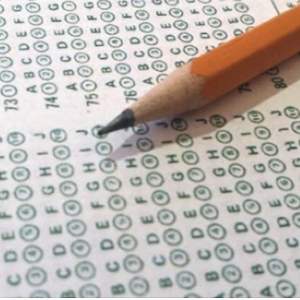You may have seen video footage from a recent meeting of New York city parents who objected to a proposal to reserve 25% of the space in certain middle schools for children who score below grade level on state tests. This policy was proposed to fight segregation, and give greater opportunities to less privileged students.
The incident highlights a systemic problem with standardized testing in our nation. Standardized tests reinforce and provide a rationale for segregation. But test scores tell us more about the students’ parental wealth and education than anything else. The process by which test questions are “normed” tends to eliminate questions that non-white students answer correctly in higher numbers. While tests provide some useful information, accountability systems have turned test scores into the central focus of far too many schools.
Pressure to increase test scores is often a major obstacle to teachers and schools that want to implement Project Based Learning. While some low-scoring schools can and do succeed in having their students do great projects, the bad news is that test pressure often marginalizes this work, and sometimes teachers only do projects in late May and June, when testing is finished.

A Stratified System
The schools doing the most exciting, innovative work around the country have found ways to downplay test scores, such as those in the Deeper Learning Network and (some) charter schools. These schools allow their students the autonomy needed to investigate and take action through projects that build on their interests. Unfortunately, schools attended by students in poverty, immigrants and students of color usually face stiff pressure to focus on test scores. This means there is an equity gap, wherein privileged students are allowed to learn to think for themselves through PBL, while those in less privileged schools must grind away at test preparation.
This division then creates a stratified school system that reflects the privilege in society. There are high-scoring schools (public and private) where student autonomy and PBL has a fighting chance, and lower-scoring schools where pressure to raise test scores rules the day. And the parents who have managed to get their students into the high-scoring schools are scared to death, like those in NYC, that low-scoring students will bring with them pressure to focus on test preparation, along with other challenges.
Standardized tests are a pillar of the phony façade of meritocracy that is used to justify the advantages that flow towards those with wealth and privilege in our society. They provide a supposedly objective basis for those advantages. Recent research has shown that the more faith young people of color put into the fairness of our society, the more they are damaged by the reality they then encounter.
Fighting Back
Some students and teachers have been building a resistance movement that challenges the test-ocracy. In Seattle, the NAACP supported teachers and students who chose to “opt out” of tests in 2015. In New York, hundreds of thousands of students have also chosen to opt out of high stakes tests for the past few years.
Schools that have championed Project Based Learning have, not coincidentally, also been pioneers in authentic assessment. Many schools in the EL Schools network have developed “passage” requirements, which ask students to prepare and defend portfolios of their work. The same is true of the Envision Schools in the San Francisco Bay Area. Schools in the New York Consortium for Performance Based Assessment have likewise developed a system of authentic tasks their students must complete prior to graduating. These Consortium schools are exempt from most of the New York state Regents exams, but have shown higher graduation rates, and better student outcomes than non-Consortium schools.
Better Evidence via PBL
This kind of authentic assessment is crucial for our work as educators. It is so important that students understand that we value genuine accomplishments far more than test scores. Rich projects challenge students to work together to come up with original solutions to real world problems. Their project work provides far more evidence of what they are capable of than the two-dimensional snapshot we get from a test score.
Of course students do need the reading and math skills that are the focus of most of our standardized tests. There is some value to checking on these skills, even through the limited lens of a test. But when these tests become central to a punitive accountability system, they have a way of crowding out other ways of learning and assessment.
Strong projects can actually help strengthen reading, writing and math skills, by placing them in the context of much more engaging work. All students deserve the chance to learn this way – not just those in more privileged schools and communities. For access to PBL to reach all students, we must end accountability systems that deliver harsh consequences to schools, teachers and students that fail to raise test scores. It is time to replace punitive test-based accountability systems with authentic assessments of student learning.

